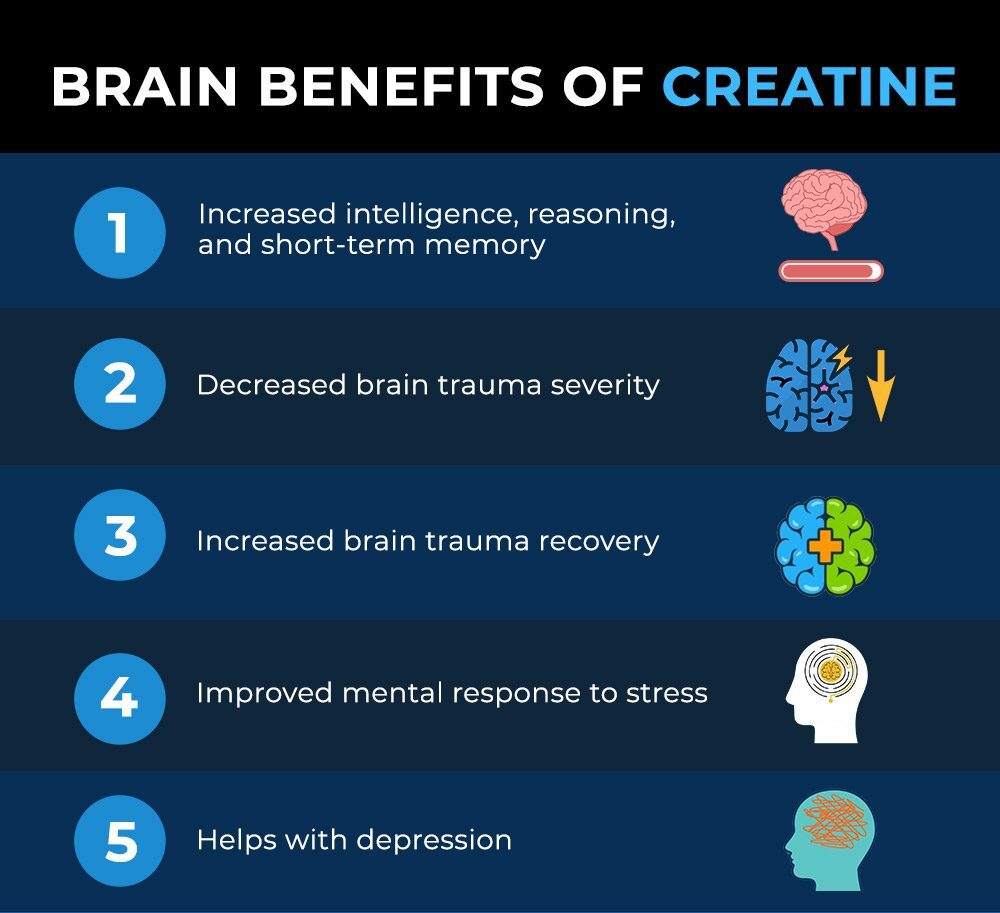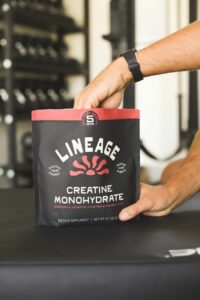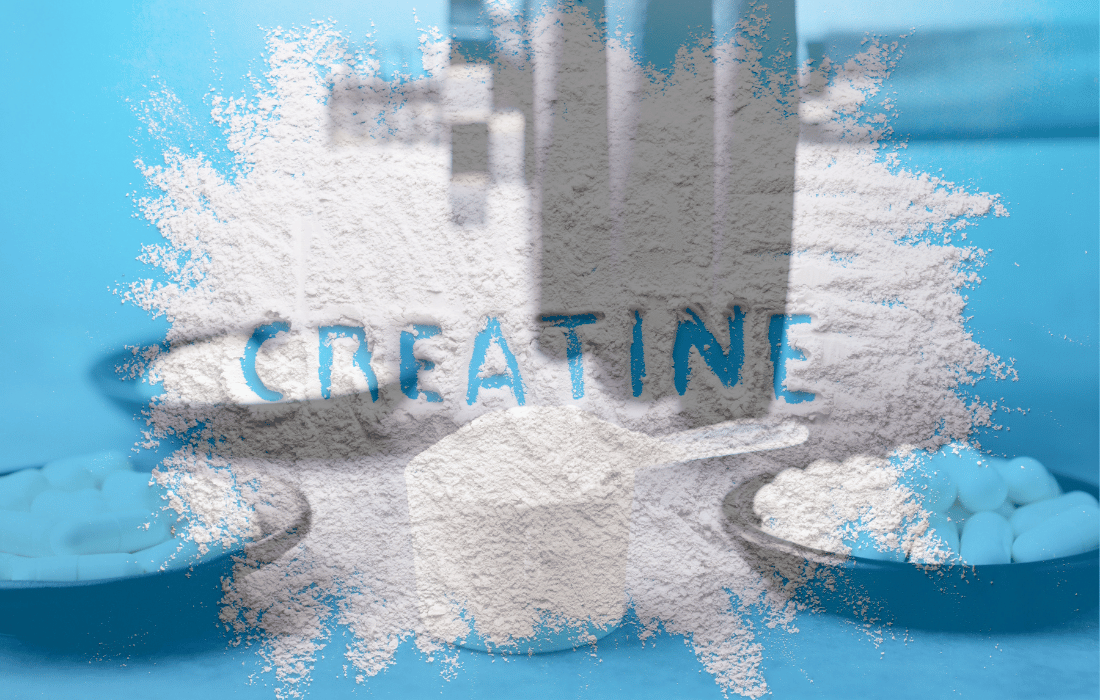If there were a Mount Rushmore of sports supplements, creatine would be on it—probably twice. Despite being one of the most researched and proven effective supplements in history, creatine still gets its fair share of skepticism and misinformation. Some think it’s a steroid (it’s not). Others believe it causes bloating, dehydration, or even kidney damage (again, no). And then some women mistakenly believe creatine is only for men, fearing it will make them bulky or increase testosterone levels—when in reality, it provides powerful benefits for both male and female athletes alike.
But here’s the truth: If you’re an athlete and you’re not taking creatine, you’re leaving performance, recovery, and even brain health on the table.
Whether you’re a powerlifter, a marathon runner, or someone who just wants to be the best in their weekend pickup game, creatine is a game-changer.
What Is Creatine and How Does It Work?
The Science of Cellular Energy
Creatine is a naturally occurring compound found primarily in muscle cells. It helps your body produce more adenosine triphosphate (ATP), which is the energy currency of your cells. Think of ATP like your phone battery: when it’s full, you’re good to go; when it’s drained, you’re sluggish and useless.
By supplementing with creatine, you increase your muscle stores of phosphocreatine, which helps regenerate ATP more quickly during high-intensity exercise. The result? More energy, better performance, and a faster recovery between sets, sprints, or whatever form of suffering your sport requires.
The Athletic Benefits of Creatine
1. Increased Strength and Power Output
It’s no surprise that creatine is a staple in strength sports. Multiple studies show that creatine supplementation leads to significant improvements in strength and power output. A 2021 meta-analysis concluded that creatine consistently improves performance in resistance training, sprinting, and power-based activities.
For example, one study found that athletes supplementing with creatine increased their one-rep max (1RM) in bench press by 5-10% compared to those who didn’t. If you’re wondering whether that’s a big deal—it is. A 5-10% strength increase could be the difference between winning a championship or just being another competitor.
2. Enhanced Endurance and Sprint Performance
While creatine is often associated with power-based athletes, endurance athletes can benefit too. Research shows that creatine helps buffer lactic acid accumulation, allowing for improved muscular endurance and delayed fatigue. A 2020 study found that creatine supplementation improved repeated sprint performance, making it invaluable for sports like soccer, basketball, and MMA—where short bursts of high-intensity effort are constant.
Additionally, recent research suggests that creatine may enhance mitochondrial function, improving oxidative energy production. This means endurance athletes may experience better stamina, making creatine relevant beyond the weight room.
3. Faster Recovery and Reduced Muscle Damage
Athletes who train intensely know that soreness is just part of life. The good news? Creatine has been shown to help with recovery by reducing muscle cell damage and inflammation. A 2019 study found that creatine supplementation helped reduce markers of muscle damage and inflammation post-exercise, which can mean less soreness and quicker recovery.
Translation: You won’t feel like you got hit by a truck after leg day.
4. Injury Prevention and Longevity
While most people take creatine for performance enhancement, its potential to reduce injury risk is an underrated aspect. Some studies suggest that creatine supplementation can improve tendon and ligament strength, reducing the likelihood of strains and tears. Given how injury-prone sports like football, MMA, and motocross can be, this is a massive advantage for long-term athletic sustainability.
Additionally, aging athletes—who naturally experience muscle loss and decreased power output—can benefit immensely from creatine. Research in 2017 found that older adults supplementing with creatine experienced improved muscle retention and functional strength compared to those who didn’t.
Brain Benefits: The Overlooked Advantage
1. Cognitive Performance and Mental Fatigue
Creatine isn’t just for muscles—it’s a powerful tool for your brain. Your brain requires ATP just like your muscles, and creatine has been shown to improve cognitive function, especially in high-stress or sleep-deprived conditions. Countless studies have shown that creatine supplementation enhanced working memory and reaction time, particularly in individuals experiencing cognitive fatigue.
For athletes, this means better focus, quicker decision-making, and improved reaction speed—something that could make all the difference in combat sports, motorsports, or any competition requiring split-second thinking.
Furthermore, emerging research suggests that creatine may provide neuroprotective effects, helping to reduce the risk of neurodegenerative diseases such as Parkinson’s and Alzheimer’s. While more studies are needed in this area, the early findings are promising and further reinforce creatine’s role in long-term brain health.
2. High-Altitude Training and Extreme Environments
Creatine is showing promise for athletes training in extreme conditions, particularly at high altitudes where oxygen availability is reduced. Studies suggest that creatine may help improve oxygen utilization and ATP regeneration, which can be crucial for mountaineers, skiers, and athletes preparing for competitions in high-altitude locations.
Additionally, military personnel operating in extreme environments—whether in desert heat or high-altitude regions—have also been studied for creatine’s role in improving resilience and cognitive function under stress. This research could translate well into applications for endurance athletes competing in extreme weather conditions.

Mythbusting: Creatine’s Biggest Misconceptions
1. Does Creatine Cause Bloating or Dehydration?
This is one of the most persistent myths. Yes, creatine increases water retention, but it’s intracellular (inside your muscle cells), not subcutaneous (under your skin). That means it makes muscles fuller, not puffy or bloated.
As for dehydration, the opposite is actually true—creatine helps with cellular hydration. Studies have found no evidence that creatine causes dehydration and suggested it might actually improve heat tolerance and hydration status.
2. Is Creatine Bad for Your Kidneys?
Unless you have pre-existing kidney disease, creatine is completely safe. This myth likely stems from the fact that creatine supplementation slightly increases creatinine levels in the blood—a marker used to assess kidney function. But this doesn’t indicate kidney damage, as confirmed by several studies that found no adverse effects of long-term creatine use on kidney function in healthy individuals.
3. Do Women Need Creatine?
Absolutely. The notion that creatine is only for men is outdated nonsense. Women benefit just as much as men—if not more—since they naturally have lower creatine stores. Research shows that female athletes who supplemented with creatine experienced greater improvements in strength, endurance, and cognitive function compared to those who didn’t.
Plus, creatine may even help with bone density, an important factor for women looking to prevent osteoporosis later in life.
Why Creatine Monohydrate is Superior
With dozens of creatine variations flooding the market, it’s easy to get confused about which one to choose. However, the research overwhelmingly supports creatine monohydrate as the gold standard.
Creatine monohydrate has been studied for decades and remains the most effective, bioavailable, and cost-efficient form of creatine available. Other forms, like creatine HCl or buffered creatine, often claim to be more absorbable, but studies consistently show that they do not offer any significant advantage over monohydrate. Additionally, many alternative forms come at a higher price tag with no proven added benefits.
If you’re looking for pure performance benefits without marketing gimmicks, creatine monohydrate is the clear winner. It’s simple, effective, and supported by mountains of research.
Why Lineage Provisions Creatine Monohydrate Stands Out
Not all creatine supplements are created equal, and Lineage Provisions has taken things a step further by ensuring purity, effectiveness, and bioavailability in their formula.

Unlike generic creatine products, Lineage Provisions sources high-quality creatine monohydrate and enhances absorption by including sea salt. This small but significant addition improves cellular hydration and nutrient transport, allowing your muscles to make the most of every dose.
One of the biggest concerns with supplements today is contamination, but Lineage Provisions guarantees a clean product by rigorously testing each batch for harmful substances like glyphosate, heavy metals, and pesticides. There are no artificial additives, sweeteners, or fillers—just pure, micronized creatine monohydrate designed for easy mixing and absorption.
This creatine is ideal for anyone looking to optimize strength, recovery, and cognitive function without unnecessary additives. Whether you’re throwing it in a post-workout smoothie, mixing it with raw milk, or simply stirring it into water, it dissolves effortlessly and delivers reliable performance benefits.
For those serious about their health and fitness, Lineage Provisions provides a research-backed, clean, and effective creatine monohydrate that aligns with an animal-based nutrition approach.
Recap: Why Every Athlete Should Be Taking Creatine
Creatine is one of the safest, most effective, and well-researched supplements available. It enhances strength, power, endurance, and recovery while offering additional benefits for brain function and hydration. Despite persistent myths, science overwhelmingly supports its safety and efficacy for both men and women.
If you’re looking for an edge in athletic performance (or just want to stop feeling like you got run over after every workout), creatine should be a staple in your supplement regimen. The only downside? You’ll have to find another excuse when you get outperformed in the gym.







